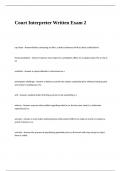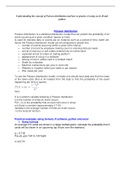● Disclaimer: Basso can add anything on the exam that is not mentioned in the study
sheet
● ☆ = concepts not in slides, not in notes, not in TAs notes
Methods
Political Analysis
● Politicians and partisanship
○ Partisanship: alignment of a political party/political affiliation
○ Politicians: involved in government-related activities
● Polemicists and ideologies
○ Polemicists: argues in opposition to other’s ideologies, often plays the devil’s
advocate
○ Ideology: high modernism characterized by an obsession with the natural
sciences and a way to manufacturer outcomes
● Political scientists
○ Comparative approach: looking at an object of study in comparison to another
○ Different approaches?
■ Refers to the social and scientific method
Hypotheses
● The inductive reasoning approach: moving from specific observations to a general
claim
○ Starts with gathering data from cases. Then reasoning, hypothesis, and theories
are created.
○ For example, observing an apple falls from a tree builds into a general claim that
gravity exists
○ Is less common in the social science field
● The deductive reasoning approach: starts with a general idea that is tested with
specific examples
○ Working from a theory, applying it and seeing whether it works/is false in other
cases (testing)
○ For example, starting with gravity and knowing it exists, then investigating if
gravity behaves the same way on the moon
○ Most common approach
● Five W’s and an H
○ Five W’s and an H is the first step to forming and answering research questions
○ At the core, anything with “why” can be a good and ideal research question- ask
a good question and you'll set yourself up for research success
Argumentation
● Normative argumentation
○ Emphasizing the way things are, but arguing that they shouldn’t be that way
(how things ought to be)
■ “I wish the sea levels would rise”
○ Usually means injecting personal biases, is judgemental
● Empirical argumentation
, ○ Involves looking for causes after examining how things are, is fact based
○ Empirical argumentation examines the way things are right now and determines
if x and y combine to create an outcome
■ I.e. “The sea levels are rising because x y z”
● Social Scientific Method
○ Compares between and among cases
○ Asking why human rights are different in Egypt vs Canada is not an ideal
comparison to make
○ Why are human rights conceptualized differently in Canada than in the United
States? is a better question
○ Don’t mix up with the social science method
○ “Why” is the most important question
Theories of theories
● Is a general understanding of specific phenomena
● A theory should explain, predict, and conclude in understanding of something. It
is a lens that helps people understand the world around them, each theory
accentuates different experiences people have
○ Explain why the apple fell from the tree, then predict if that apple is going to
behave in the same way in another time/location
● Is there a process for making theories?
○ There is no process, as theories mean different things to different people
● A theory must be:
○ Concise and systematic
■ When you have two theories that explain the same argument equally as
well, the unnecessary variables must be cut
■ Social science: attempting to get from start to end with fewest variables
possible
○ Coherent
■ A theory cannot contradict itself
○ Predictive
■ Must be projected into the future
○ Broadly applicable
■ Has to apply to two or more cases, meaning you can now understand a
class of cases
● A theory is not:
○ An ideology or presupposed belief system
○ A hypothesis, because it involves no fact
○ Idiographic or nomothetic (unique personality vs personality trait)
● Limits to theories
○ Theories can be oversimplified
■ Instead of saying: “Human beings that breathe are more likely to vote” try
“people living in Alberta who work in the oil and gas sector are more likely
to vote Conservative”
, ○ Limited range of vision/limited scope
■ Zoom out, don’t zoom in
● If a hiker is lost in a forest, all he sees are trees around him.
However, if he had a drone, he would be able to zoom out and
see landmarks and where he is (don't blind yourself/close yourself
off)
● Theories are beneficial but must be used sparingly
Concepts
● An explanation for a class of something
● Good concepts are:
○ Clear and coherent
■ Giovanni Sartori’s ladder of abstraction
● Going up the ladder increases the number of cases it is applicable
to (very general)
○ General theory can be a bad thing because it explains
nothing/is too broad
● Going down the ladder decreases number of cases but increases
the specificity
○ Logically consistent
○ Useful
■ As soon as the white board has been created, there is now an
explanation for the white board marker. A white board marker will have no
purpose without a white board
○ ☆Concept stretching
● Clear & coherent, logically consistent, and useful → means that these
concepts are “good”
Variables
● Dependent variables
○ The endpoint is dependent on the variable
○ Does the dependent variable change based on the levels of the independent
variable?
● Independent variable
○ Something within the equation that you can isolate and alter the levels of
○ Demographics, education level, etc.
● In this scenario:
○ IV1A + IV2A + IV3A = DV1
○ IV1A + IV2A + IV3B = DV2
■ IV3A and IV3B appear to be the causal variable because they are what is
“variable”
Evidence
● Claims vs facts vs evidence
● Types of sources: can be pictures, text messages, videos, primary data, secondary data,
etc
○ Primary data: Looking at things produced by the person, institution or society
sheet
● ☆ = concepts not in slides, not in notes, not in TAs notes
Methods
Political Analysis
● Politicians and partisanship
○ Partisanship: alignment of a political party/political affiliation
○ Politicians: involved in government-related activities
● Polemicists and ideologies
○ Polemicists: argues in opposition to other’s ideologies, often plays the devil’s
advocate
○ Ideology: high modernism characterized by an obsession with the natural
sciences and a way to manufacturer outcomes
● Political scientists
○ Comparative approach: looking at an object of study in comparison to another
○ Different approaches?
■ Refers to the social and scientific method
Hypotheses
● The inductive reasoning approach: moving from specific observations to a general
claim
○ Starts with gathering data from cases. Then reasoning, hypothesis, and theories
are created.
○ For example, observing an apple falls from a tree builds into a general claim that
gravity exists
○ Is less common in the social science field
● The deductive reasoning approach: starts with a general idea that is tested with
specific examples
○ Working from a theory, applying it and seeing whether it works/is false in other
cases (testing)
○ For example, starting with gravity and knowing it exists, then investigating if
gravity behaves the same way on the moon
○ Most common approach
● Five W’s and an H
○ Five W’s and an H is the first step to forming and answering research questions
○ At the core, anything with “why” can be a good and ideal research question- ask
a good question and you'll set yourself up for research success
Argumentation
● Normative argumentation
○ Emphasizing the way things are, but arguing that they shouldn’t be that way
(how things ought to be)
■ “I wish the sea levels would rise”
○ Usually means injecting personal biases, is judgemental
● Empirical argumentation
, ○ Involves looking for causes after examining how things are, is fact based
○ Empirical argumentation examines the way things are right now and determines
if x and y combine to create an outcome
■ I.e. “The sea levels are rising because x y z”
● Social Scientific Method
○ Compares between and among cases
○ Asking why human rights are different in Egypt vs Canada is not an ideal
comparison to make
○ Why are human rights conceptualized differently in Canada than in the United
States? is a better question
○ Don’t mix up with the social science method
○ “Why” is the most important question
Theories of theories
● Is a general understanding of specific phenomena
● A theory should explain, predict, and conclude in understanding of something. It
is a lens that helps people understand the world around them, each theory
accentuates different experiences people have
○ Explain why the apple fell from the tree, then predict if that apple is going to
behave in the same way in another time/location
● Is there a process for making theories?
○ There is no process, as theories mean different things to different people
● A theory must be:
○ Concise and systematic
■ When you have two theories that explain the same argument equally as
well, the unnecessary variables must be cut
■ Social science: attempting to get from start to end with fewest variables
possible
○ Coherent
■ A theory cannot contradict itself
○ Predictive
■ Must be projected into the future
○ Broadly applicable
■ Has to apply to two or more cases, meaning you can now understand a
class of cases
● A theory is not:
○ An ideology or presupposed belief system
○ A hypothesis, because it involves no fact
○ Idiographic or nomothetic (unique personality vs personality trait)
● Limits to theories
○ Theories can be oversimplified
■ Instead of saying: “Human beings that breathe are more likely to vote” try
“people living in Alberta who work in the oil and gas sector are more likely
to vote Conservative”
, ○ Limited range of vision/limited scope
■ Zoom out, don’t zoom in
● If a hiker is lost in a forest, all he sees are trees around him.
However, if he had a drone, he would be able to zoom out and
see landmarks and where he is (don't blind yourself/close yourself
off)
● Theories are beneficial but must be used sparingly
Concepts
● An explanation for a class of something
● Good concepts are:
○ Clear and coherent
■ Giovanni Sartori’s ladder of abstraction
● Going up the ladder increases the number of cases it is applicable
to (very general)
○ General theory can be a bad thing because it explains
nothing/is too broad
● Going down the ladder decreases number of cases but increases
the specificity
○ Logically consistent
○ Useful
■ As soon as the white board has been created, there is now an
explanation for the white board marker. A white board marker will have no
purpose without a white board
○ ☆Concept stretching
● Clear & coherent, logically consistent, and useful → means that these
concepts are “good”
Variables
● Dependent variables
○ The endpoint is dependent on the variable
○ Does the dependent variable change based on the levels of the independent
variable?
● Independent variable
○ Something within the equation that you can isolate and alter the levels of
○ Demographics, education level, etc.
● In this scenario:
○ IV1A + IV2A + IV3A = DV1
○ IV1A + IV2A + IV3B = DV2
■ IV3A and IV3B appear to be the causal variable because they are what is
“variable”
Evidence
● Claims vs facts vs evidence
● Types of sources: can be pictures, text messages, videos, primary data, secondary data,
etc
○ Primary data: Looking at things produced by the person, institution or society






